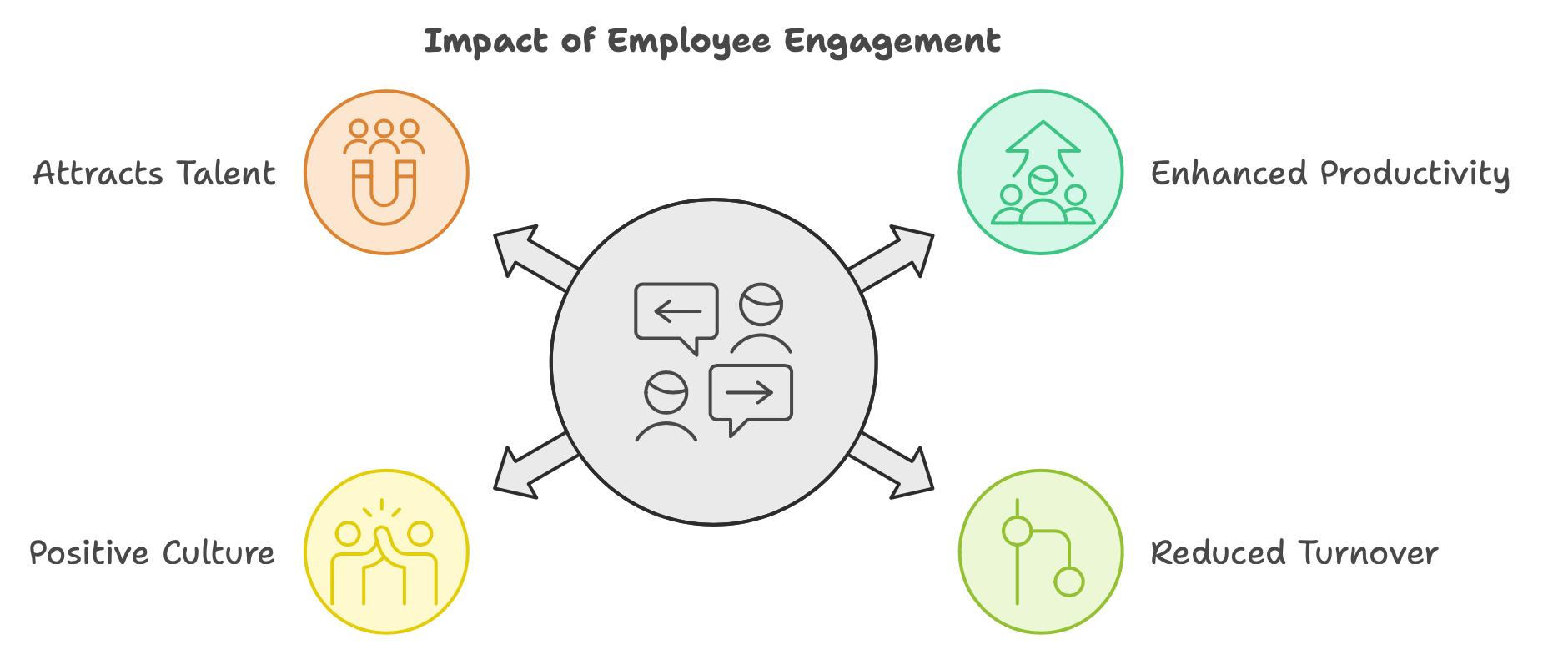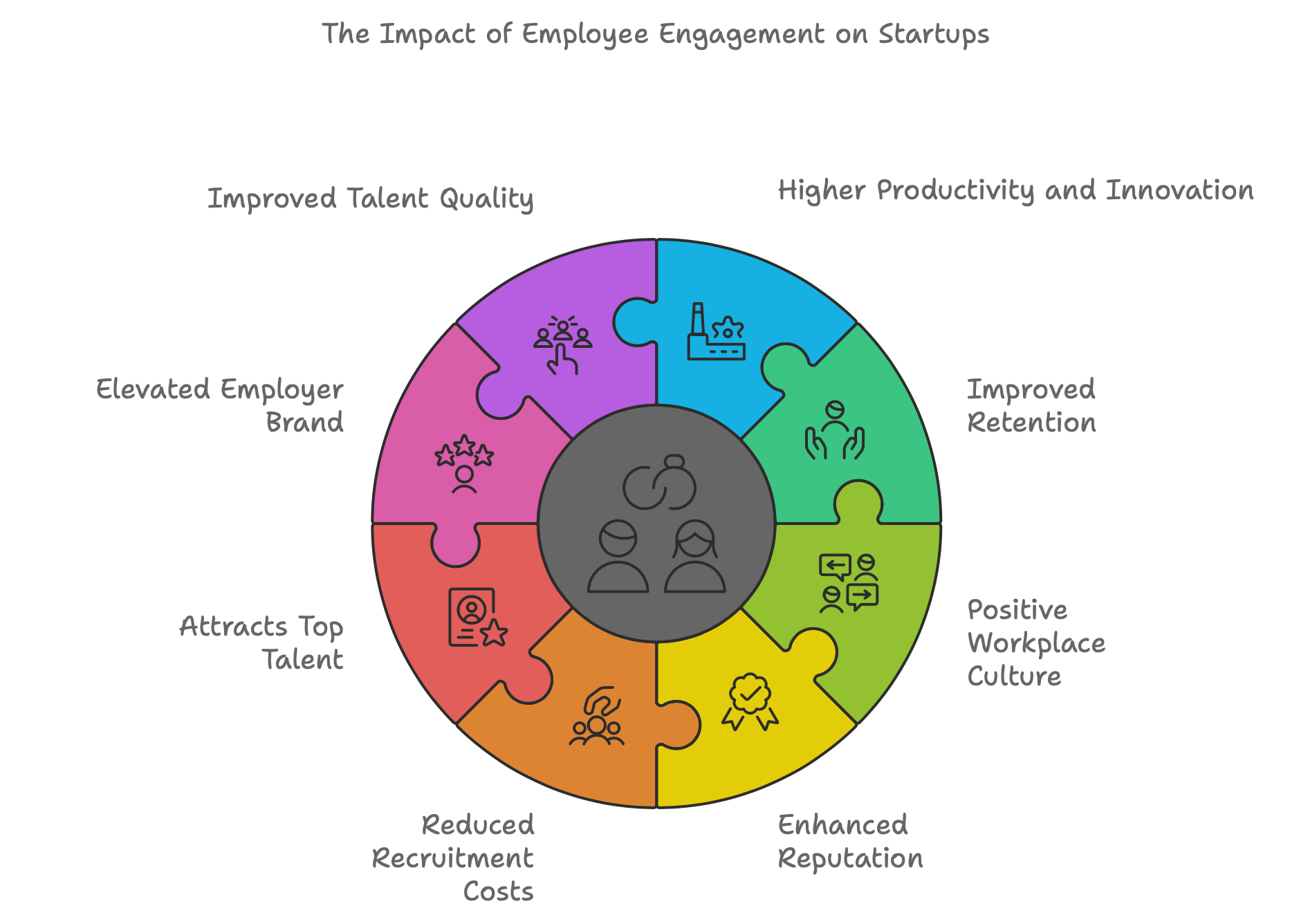What is Employee Engagement?
Employee engagement is crucial for any company, but it holds particular significance for startups, especially in the context of talent acquisition. Here's why employee engagement is essential and how it influences talent acquisition:

Higher Productivity and Innovation:
- Engaged employees are more motivated, leading to higher levels of productivity and innovation. They go the extra mile to find creative solutions to problems and drive the company's success.
Improved Retention:
- Engaged employees are more likely to stay with the company. This reduces turnover and the associated costs of recruiting and training new employees, a critical consideration for startups with limited resources.
Positive Workplace Culture:
- Employee engagement contributes to a positive workplace culture where employees feel valued, supported, and included. This culture attracts and retains top talent who seek a healthy work environment.
Enhanced Reputation:
- Startups with a reputation for high employee engagement are more attractive to potential hires. Word of mouth and reviews from current employees can influence the perception of the company among job seekers.
Reduced Recruitment Costs:
- When employees are engaged and satisfied, they are more likely to refer qualified candidates for open positions. This can significantly reduce recruitment costs and time-to-fill vacancies.
Attracts Top Talent:
- In a competitive job market, startups that prioritize employee engagement are more likely to attract top talent. Talented candidates are drawn to companies where they see opportunities for growth, personal development, and a positive work culture. Also I recommend you to read our article about Startagies, Tactics and Step of Winning Top Candidates in SME - How Growing and Scaling Businesses Can Attract Top Talent: Proven HR Strategies for Success
Elevated Employer Brand:
- An engaged workforce contributes to a strong employer brand. A positive reputation for valuing and supporting employees is an attractive selling point for potential hires. Read about Effective Employer Branding: Leveraging Social Media and Online Platforms

Improved Talent Quality:
- Engaged employees often refer candidates who align with the company's values and goals. This can lead to a higher quality of talent in the recruitment pool.
Efficient Onboarding:
- Engaged employees tend to have a positive impact on new hires. They can provide support and mentorship during the onboarding process, helping new employees integrate faster and become productive sooner. I recommend you to read our article: Onboarding Guide for Hybrid and Remote Teams
Lower Recruitment Risk:
- Engaged employees are less likely to leave shortly after joining the company. This reduces the risk of bad hires and the costs associated with replacing them.
Adaptability and Growth:
- Engaged employees are more likely to adapt to the fast-paced, dynamic environment of startups. Their dedication and willingness to learn contribute to the company's growth and success.
- Engaged employees are more likely to contribute new ideas and collaborate on problem-solving, which is critical for startups seeking to overcome challenges and seize opportunities.
Remember, employee engagement plays a critical role in shaping the success and growth of startups. It enhances productivity, reduces turnover, fosters a positive company culture, and makes the organization more attractive to top talent. Ultimately, engaged employees become brand ambassadors who help recruit and retain the talent necessary for the startup's success in a competitive business landscape.
I also recommend you to read related articles:
Small Wins, Big Impact: Elevating Your Talent Acquisition and HR Strategy
People are wandering Why do I need Headhunting? I just make a new opening on LinkedIn and get good candidates... Learn the reasons UnitiQ makes both traditional hiring and proactive talent acquisition people call Headhunting: How Headhunting Differentiates Your Talent Strategy from Regular Recruitment Process?
I also recommend you to read related articles:
Small Wins, Big Impact: Elevating Your Talent Acquisition and HR Strategy
People are wandering Why do I need Headhunting? I just make a new opening on LinkedIn and get good candidates... Learn the reasons UnitiQ makes both traditional hiring and proactive talent acquisition people call Headhunting: How Headhunting Differentiates Your Talent Strategy from Regular Recruitment Process?
UnitiQ: Elevating Employee Engagement for Startup Growth
At UnitiQ, we recognize that employee engagement isn't just a buzzword - it's a driving force behind a startup's success. We help young companies cultivate a workplace culture where employees feel truly connected to the mission, motivated to innovate, and committed to achieving great results.
Our approach goes beyond standard practices; we tailor engagement strategies that resonate with your team’s values and aspirations. By fostering a sense of belonging and purpose, UnitiQ helps you not only retain top talent but also attract individuals who are eager to be part of your journey, fueling sustainable growth and long-term success.
I'll be glad to be your Fractional / Interim HR Executive. DM me today for getting a special offer
My Telegram
My LinkedIn
Our approach goes beyond standard practices; we tailor engagement strategies that resonate with your team’s values and aspirations. By fostering a sense of belonging and purpose, UnitiQ helps you not only retain top talent but also attract individuals who are eager to be part of your journey, fueling sustainable growth and long-term success.
I'll be glad to be your Fractional / Interim HR Executive. DM me today for getting a special offer
My Telegram
My LinkedIn








